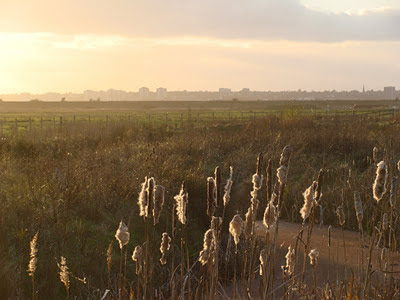 |
| Sunset at RSPB Cliffe Pools |
A blog for World Wetland's Day
So today is all about celebrating our wetlands (our rivers, estuaries, lakes, marshes and more) first marked by the signing of the Ramsar Convention on February 2nd 1971. The treaty was set up to promote the conservation of wetlands and, through their economic importance, sustainable management. Interestingly, it’s the only treaty that focuses on a particular ecosystem. As a result it has become an increasingly important environmental designation.
Last year I discovered the amazing Tavira Saltflats in Southern Portugal. I stumbled onto them half by mistake really, wandering around the small town; I was soon surrounded by Avocets, Kentish Plovers, Wood Sandpipers and more. Crouched in a ditch at a good distance, I watched a pair of nesting Black-winged Stilts for an hour or more. I was really taken by the place and the glorious wildlife on offer. The habitat and conditions were very different from where I find myself today but there’s not a day that passes when I’m not reminded how special our wetlands are.
The north Kent marshes are a vast, open place; fields as far as the eye can see, an endless sky. Man has lent a helping hand but there is no doubting their wildness. There is little respite from the elements. Yesterday was hard going at times; icy winds sailed through my layers as a few of us fixed a pump and some lay-flats so that we could flood some rills and, in time, create good conditions for wintering wildfowl. But I only had to glance up occasionally to forget that I couldn't feel my hands and appreciate what this land offers. That vastness is continuous habitat; our stomping boots disturbing a secretive Jack Snipe into flight, a Merlin effortlessly dashing by. That vastness is a sense of perspective in an otherwise hectic world; silent but for the wind, a sun sinking into rushing reeds.
A slight concern is that at the moment these wetlands could be wetter. The rain just isn’t coming, any here is a cause for celebration! It’s not just here either; a changing climate is one of the many global threats to these sensitive habitats. Apparently 50% of the world’s wetlands have been lost or degraded in the last century. If accurate, that’s a frightening statistic and shows why the Ramsar Convention is so important. Drainage and conversion for farmland and development has had a huge impact, as has pollution and contamination resulting from rising sea levels.
We stand to lose so much and not just the stuff that we can see: numerous species of birds, mammals, fish etc that depend on them (not to mention the livelihoods of many people) The term ‘environmental services’ is thrown around a lot. This refers to all the essential functions the land, including wetlands, provide. This means nutrient cycling, pollination, carbon storage and of course, oxygen production. And what about flood protection? Estuaries, salt marshes, floodplains...these are a natural 'sponge' - the most effective way of reducing the flood risk. Are you reading this Boris?! Coming back to Norman Foster’s plan for the north Kent marshes I heard a reference to a new flood defence system “more advanced than the Thames Barrier”. Well, yeah, it’s the one you want to build on. If this area (and others like it) is to stay like this, the financial argument will inevitably carry significant weight. I’d love to know how all these services could be valued and how much they are worth. Priceless surely?
 |
No comments:
Post a Comment